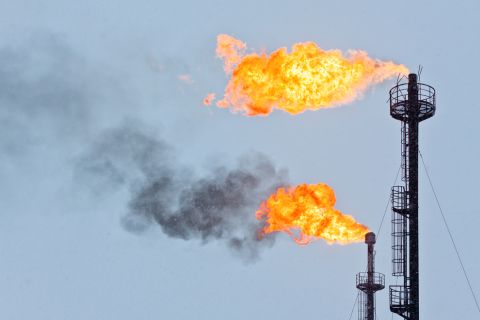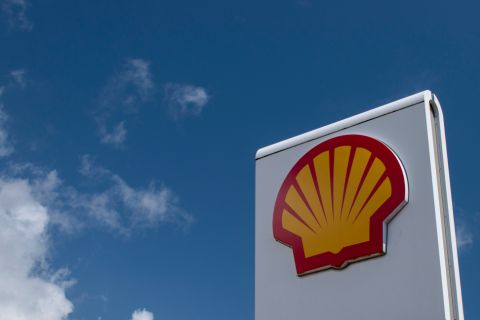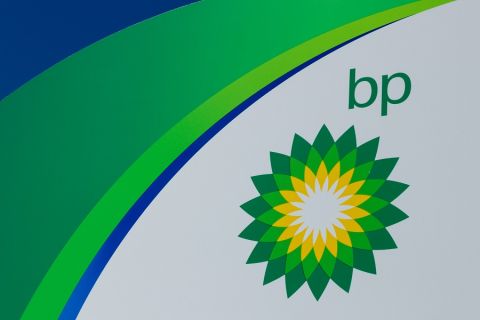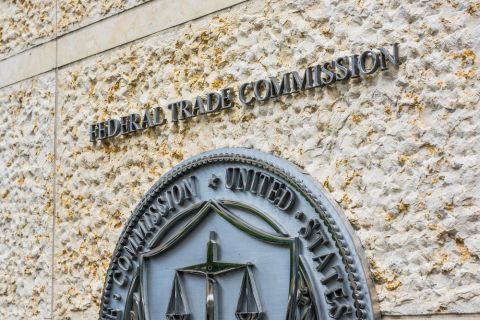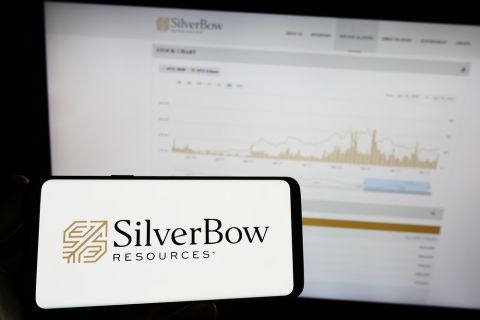Conventional wisdom these days claims that the midsize exploration and production outfit is probably no longer viable-it's just a matter of time before it must merge with another company to gain critical mass. But at Noble Affiliates Inc. , the focus is on the future. That future is expected to include a 10% increase in production this year, finally turning around after a couple of mediocre years. Momentum has been regained, with 2000 reserve replacement of 288%-more than a third of that coming from Israeli gas discoveries. The Houston independent says its 2001 capital budget will be 40% higher than last year, rising to $700 million. A full 42% of that will be dedicated to domestic and international exploration. The company's future includes a large methanol plant in Equatorial Guinea, West Africa, which comes onstream in the second quarter, at a time when world methanol prices are the highest they've been in years. Longer-term (think 2002 and 2003), Noble's portfolio also includes a world-class discovery being developed offshore Israel that may hold more than 1.2 trillion cubic feet of natural gas. Production is also set to begin, or increase, from Noble's projects elsewhere around the globe, in the deepwater Gulf of Mexico, Bohai Bay in China, the North Sea, Argentina and offshore Ecuador. Then there's the recently acquired 1.25-million-acre (net) concession offshore Vietnam. The new man presiding at the conference table is president and chief executive officer Charles D. (Chuck) Davidson, who last summer found himself winding down as CEO of the successful Vastar Resources because BP was absorbing Vastar and its parent, Arco. Davidson, who had been with Arco since 1972, joined Noble in October, arriving when the company was at a turning point. Long-time chairman Robert Kelley had just announced he would retire this April after being CEO since 1986. The company moved its headquarters from Ardmore, Oklahoma, to Houston in October, joining the operations of wholly owned subsidiary Samedan Oil Corp. , which was already based there. In 1932 the Noble family founded the company with onshore plays the cornerstone. In 1996 Noble acquired Energy Development Corp. , which had many international concessions. Today, Samedan receives high marks for its Gulf of Mexico operations. The company has 180 undeveloped leases in the Gulf, of which 60 are in deep water. "This is an extraordinary period for the company," Davidson says. "It has a great history, but we are moving into an era where we can be a leader in the international arena. It's an opportunity and a challenge, if we remain focused on the best prospects and can execute properly." The legacy he brings to his new position is a reputation for success and familiarity with Wall Street. Analysts and investors frequently emphasize their focus on the management of a company-in this case, it's playing a significant yet subtle role in how they will view Noble going forward. Most analysts have a Buy on NYSE-traded NBL and have been upgrading their earnings projections in the last six months. "Whenever you invest in a company, you start with management, and I'm very impressed with Chuck Davidson. He has a keen business sense and he did a great job at Vastar," says Larry Benedetto. Believing the stock is undervalued, the New Orleans-based analyst for Howard, Weil, Labouisse, Friedrichs Inc. has a Buy on the stock with a price target of $50. That's despite the fact that the stock has more than doubled from $20 to around $44 in the past year. Salomon Smith Barney analyst Bob Morris also targets $50, based on a multiple of 4.8 times discretionary cash flow for 2001, citing the company's stepped-up domestic drilling pace and international operations. Brad Beago, E&P analyst with Credit Lyonnais Securities USA Inc. in Houston, says, "Out of all the large-cap companies, to me it is the most underappreciated. And I am not even counting Israel and Ecuador in my models." He has a target of $60 and estimates earnings per share will be $5.39 in 2001. So, what does Davidson bring to Noble from his career at Vastar? He modestly says it's no more than common sense and experience that most people would have gained along the way, no matter where they had worked in the oil patch. "One thing I learned was the importance of the mechanics of the E&P business and what works," he says. "And, I learned that you've got to maintain a balanced program. By that, I mean you've got to have a good portfolio of drilling opportunities that can lead to near-term growth and step-function growth. You can't just concentrate on quick hits and you can't just concentrate on the elephants." Davidson talks repeatedly about being a low-cost producer, too. Based on third-party analysis, the methanol plant in West Africa (operated by CMS Energy) will be the second-lowest-cost producer in the world out of about 50 such plants, with costs of about 19 cents per gallon versus 28 to 30 cents in the U.S. The company's planned gas-fired power generation project in Ecuador should produce the second-lowest cost of power available in that country, behind hydropower. Drilling in the offshore Amistad Field is continuing, but the company is seeking a partner for Amistad and the power plant, which has already been approved by the government, and for which two turbine generators are on order. To newcomer Davidson, making organizational changes at Noble has taken a backseat to other goals. "Due to retirements, we'll have some new people along the way, and that will give us some fresh ideas, but I have not really made structural changes. I think it is more important to establish clear goals and strategies and have those communicated well so that everybody is behind them." Noble has often traded at a discount to its peer group, as it was not as proactive with the Street as some other companies have been. Davidson aims to change that. "The investment world has to see a clear path forward and consistent results. You can't underestimate the importance of communicating your vision, to really differentiate yourself from other companies. I am very confident that you can have a great-performing E&P company and still be undervalued, underappreciated and unknown-investors have so many choices." Increased communication turns out to have some unexpected benefits. The CEO of a large-cap E&P peer contacted Davidson recently to discuss swapping some assets after he saw some of Davidson's remarks on the Internet. "That's just one example of how you have to get your story out there," he says. "This person did not realize we were even in that country, until he happened to see my comments." Like many independents of this size (the company's market cap is about $2.4 billion), deepwater and international projects are increasingly seen as the ticket to success, with traditional onshore and shallow-water plays being the cash flow foundation. When the downturn hit full force in 1998 and 1999, Noble chopped spending, electing to drill fewer wells in 1999 than it had at any time in the prior 11 years, and it sold off some assets. Disappointed investors watched from the sidelines as cash flows fell due to poor commodity prices and declining production. Analysts were skeptical about the company's international operations. During the lull in activity, management strengthened the balance sheet and completed an off-balance-sheet project financing for its share of the 20,000-barrel-per-day methanol plant in Equatorial Guinea. At press time, the plant was to begin taking 125 million cubic feet per day of gas from the offshore Alba Field, where the eighth well has been tested and the pipelines are installed. Contracts to sell all of the 2001 methanol output are already in place. Last October, Davidson announced that production was finally growing again, particularly from assets in the Gulf of Mexico. There should be more to come as the company's international projects begin to take hold during the next two or three years. Indeed, despite half a dozen promising deepwater projects slated for 2001, Noble's international assets are overshadowing the domestic at the moment, analysts say. "When I came here all I really knew was Samedan and their offshore operations, which appealed to me, as I had been working on offshore at Vastar," says Davidson. "The surprise to me was the depth and breadth and quality of the international portfolio-not just that Noble was in a lot of places, but that a lot of the projects were really becoming what I call legacy assets. "We now have a line-up of defined projects that will add an additional 40,000 barrels a day equivalent, net to Noble, from now to 2003-and Israel, Equatorial Guinea and Ecuador do not decline in that time frame. When I looked at the Israeli discoveries made in late 1999 and early 2000, I said, 'My goodness, this is not hype, this is reality.'" The Mari B Field is about 20 miles southwest of Tel Aviv, on the Israeli-Egyptian offshore border. It is estimated to hold gross reserves of about 1 trillion cubic feet, with the first two wells testing at 33 million cubic feet per day. The company has found 550 feet of continuous reservoir, based on those two wells. The adjacent Noa Field holds about 200 billion cubic feet of gas. Noble has 47% of, and operates, each field. Its partners are two Israeli firms. Israel Electric Corp. is currently negotiating two contracts to purchase as much as 3.2 billion cubic meters of gas for its seven power plants onshore. About 55% of that could come from Egypt, but the remainder would be from Noble's fields. That translates to about 140 million cubic feet per day. This winter the company had high hopes for a third prospect, Andromeda, which was drilled on a larger, but riskier, structure in water 3,200 feet deep, west of Noa. But at press time this well was declared noncommercial, even though some gas was found. The semisubmersible now moves to drill another well at Mari B Field. Meanwhile, the West African methanol project has already achieved legacy status, thinks Davidson. "It will be a big component of our cash flow and earnings going forward, nominally for 20 years." Alba Field, operated by CMS Energy 's oil and gas unit, is estimated to have 1.5 Tcf of gas and 100 million barrels of liquids, gross, and should feed the methanol plant for at least 20 years. Noble owns 34% of the field and 45% (after payout) of the plant. Out of initial production of 250 million cubic feet a day, about 125 million will supply the plant and about 90 million will be reinjected offshore. "The good news is, the price of methanol is about 80 cents a gallon, whereas a year ago it was 35 cents," notes analyst Benedetto. "And, Noble locked in tanker rates at a low price about a year ago. There will be a huge margin-this is going to be a real winner." The analyst projects earnings per share to rise to $4.17 in 2001 from $3.59 last year, based on $24 oil and $4.75 natural gas, and adds that the company's biggest risk is probably commodity prices. Beago estimates the plant could produce cash flow of about $50- to $60 million annually, net to Noble, for several years. "A lot of analysts sort of pooh-poohed it, thinking it was a diversion for them...but they will also be selling gas into the plant and stripping the liquids out and selling those-that could be another $42 million a year." More than 40% of the company's $300-million 2001 budget will be directed toward several shallow- and deepwater prospects in the Gulf of Mexico. Part of that will be applied toward its 2000 agreement with McMoRan Exploration of New Orleans. The agreement gained Noble access to McMoRan's 100 blocks. In general, Noble ends up with a 25% interest in everything McMoRan plans to do, mainly on blocks the latter acquired from Texaco and Shell during the last 18 months. Four deepwater prospects will see the drillbit this year: Crete, Lost Ark, Queen of Hearts and Alpine. On the latter two, Noble is seeking a partner, to reduce its 97% working interest. Davidson says he will make decisions quickly because it is too costly to remain in any region where activity is not significant or going well. And to reduce risk, he wants to reduce the company's ownership stakes in Ecuador and on some deepwater blocks in the Gulf of Mexico. "It's easy to lose the long-term perspective so it's important not to be influenced by these high commodity prices," he says. "We want to invest in projects that can earn a return in all price cycles-you destroy value if you don't. It's important to ration capital wisely."
Recommended Reading
Green Swan Seeks US Financing for Global Decarbonization Projects
2024-02-21 - Green Swan, an investment platform seeking to provide capital to countries signed on to the Paris Agreement, is courting U.S. investors to fund decarbonization projects in countries including Iran and Venezuela, its executives told Hart Energy.
Shell’s CEO Sawan Says Confidence in US LNG is Slipping
2024-02-05 - Issues related to Venture Global LNG’s contract commitments and U.S. President Joe Biden’s recent decision to pause approvals of new U.S. liquefaction plants have raised questions about the reliability of the American LNG sector, according to Shell CEO Wael Sawan.
BP Pursues ‘25-by-‘25’ Target to Amp Up LNG Production
2024-02-15 - BP wants to boost its LNG portfolio to 25 mtpa by 2025 under a plan dubbed “25-by-25,” upping its portfolio by 9% compared to 2023, CEO Murray Auchincloss said during the company’s webcast with analysts.
Sunoco’s $7B Acquisition of NuStar Evades Further FTC Scrutiny
2024-04-09 - The waiting period under the Hart-Scott-Rodino Antitrust Improvements Act for Sunoco’s pending acquisition of NuStar Energy has expired, bringing the deal one step closer to completion.
Kimmeridge Fast Forwards on SilverBow with Takeover Bid
2024-03-13 - Investment firm Kimmeridge Energy Management, which first asked for additional SilverBow Resources board seats, has followed up with a buyout offer. A deal would make a nearly 1 Bcfe/d Eagle Ford pureplay.

